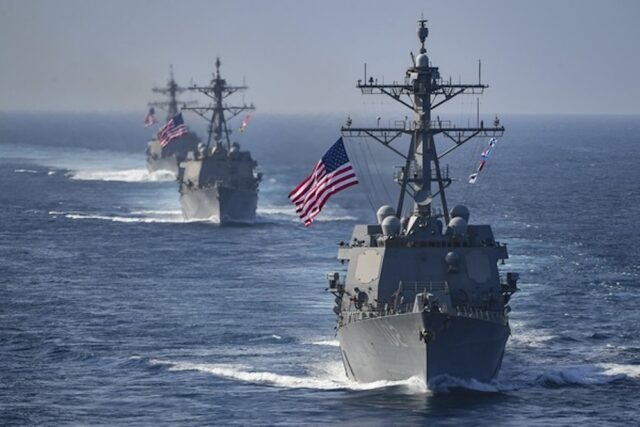Brigadier General Mohammad Reza Naqdi, coordinating commander of the Iranian Revolutionary Guards Corps, has announced that Iran will close the Mediterranean Sea in retaliation for “U.S. war crimes” in Gaza. “They shall soon await the closure of the Mediterranean Sea, (the Strait of) Gibraltar and other waterways.”
It is an expansion of attacks — both verbal and military — by Iran and its proxies for years but ramped up since the Hamas atrocities against Israel on October 7. U.S. forces in Iraq and Syria have been attacked at least 150 times since President Joe Biden took office, two U.S. defense officials told VOA. More than 103 rocket and drone attacks have occurred since Oct. 17.
Houthi terrorists have fired on more than 100 ships in the Red Sea and beyond since November. They claim the ships, including American ships, are Israeli or traveling to Israel and are thus, somehow, legitimate targets. Ships of several nations were affected and some large shipping companies — including Maersk and BP — said that, at least temporarily, they would not use the Red Sea to move cargo to the Mediterranean. Oil prices immediately rose two percent.
This is an act of war and should be treated by the U.S. as one. USCENTCOM operates in the Red Sea and has a firm grasp on Houthi — and Iranian — capabilities. Israel is a member of CENTCOM and should be able to call on its assets.
Instead, the U.S. formulated something called Operation Prosperity Guardian (OPG). It is already on life-support as three major American allies announced they won’t participate. The French Defense Minister said that French naval assets in the region would remain under French command. Italian sources report that the Italian navy will respond to requests from Italian ships, but not in cooperation with OPG. Spain’s naval assets will be used only in coordination with NATO and/or the EU.
In addition to BG Naqdi’s boasts, Iran responded to Western hesitance with an expansion of Iranian assistance to the Houthis, who have now attacked a ship in the Indian Ocean. A U.S. National Security Council spokesperson said, “Iranian-provided tactical intelligence has been critical in enabling Houthi targeting of maritime vessels since the group commenced attacks in November,” adding that the drones and missiles the Houthis have been using for the attacks were also provided by Iran.
This is what happens when a country is nice to people who want to destroy it and all its friends. That would be the Biden administration being nice to Iran and its friends.
One of President Biden’s first moves in 2021 was to remove the Houthis from the terror-sponsor list. Oil sale waivers allowed Iran access to billions of dollars. According to the IMF, Iran’s currency reserves fell from $122.47 billion to under $15 billion in 2019, before rising to $42 billion in 2023. That’s without the $6 billion the administration tried to put in Tehran’s Qatari bank account this year. In July, the White House announced that it had given more than $315 million to the Palestinians this year — and nearly a billion since the administration took office. The UN embargo on Iran’s production and sale of ballistic missiles expired in November with no U.S. comment. Last week, a Venezuelan money-launderer under indictment in the U.S. was released and shipped back to Venezuela — his clients included Hezb’allah.
None of which “moderated” Iran or Hamas or the Houthis — there is nothing “moderate” about people whose religious ideology drives them to death for themselves and others.
And all that time, Iran was shipping missiles, drones, and precision-guided weapons factories to its proxies — and selling drones to Russia for use in Ukraine. By distributing its assets around the region, Iran appeared to be hoping that attacks on America (or Israel) would escape direct American (or Israeli) retaliation. Thus far, the mullahs have been right about the U.S., which has declined, until now, to retaliate (Israel is a different story).
![]() This week, the U.S. finally struck back after an Iranian drone strike wounded three American soldiers in Iraq. But the retaliation was also in Iraq — meaning Iran fired from Iran into Iraq and the U.S. did not go after the perpetrators. When Syria used chemical weapons on its own people, the Trump administration destroyed the al Shayrat military air base from which the attack was launched. We have the assets to do that to Iran and to the Houthis.
This week, the U.S. finally struck back after an Iranian drone strike wounded three American soldiers in Iraq. But the retaliation was also in Iraq — meaning Iran fired from Iran into Iraq and the U.S. did not go after the perpetrators. When Syria used chemical weapons on its own people, the Trump administration destroyed the al Shayrat military air base from which the attack was launched. We have the assets to do that to Iran and to the Houthis.
Since World War II, the United States has been the preeminent guarantor of freedom of navigation in the face of difficult and ongoing trends — the establishment of dozens of independent and sometimes hostile countries lining the waterways, rather than colonies with colonial troops; the rise of Chinese and Russian fleets; and the expansion of Iran.
But we reflagged Kuwaiti oil tankers in the 1980s during the Iran-Iraq war — leading the late Johnny Carson to opine that since those were now our ships, that was now our oil. We led an international coalition to prevent North Korean smuggling and one to fight off Somali pirates. We carry out freedom of navigation exercises in the South China Sea and the Taiwan Straits.
But we need two things ultimately to be successful — a plan and allies. Both appear threadbare at the moment.






